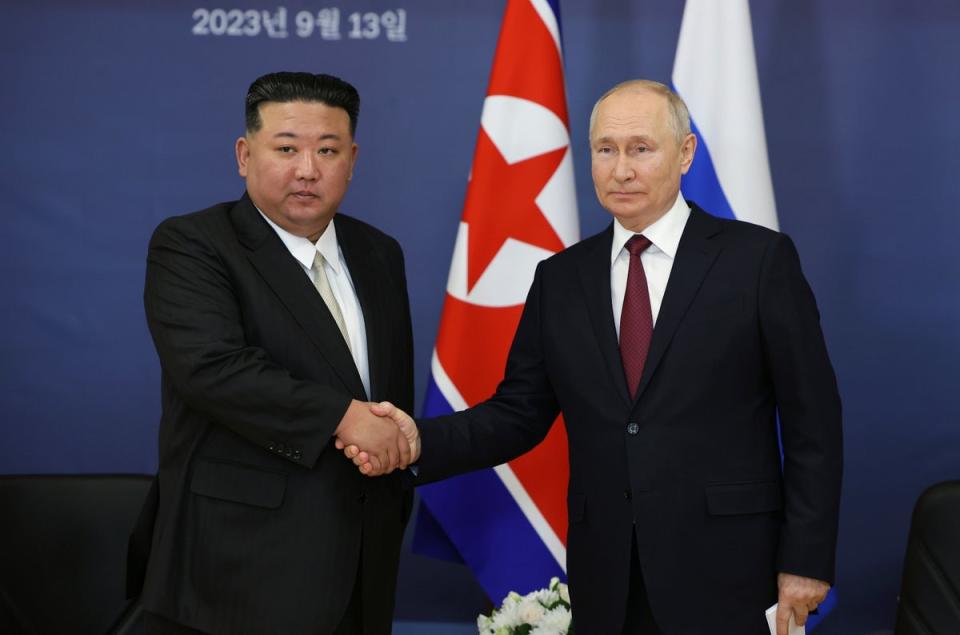Defence secretary warns of further wars with Russia, China and Iran in next five years
Britain should prepare for further wars involving China, Russia, Iran and North Korea in the next five years, Grant Shapps has warned.
In his first speech as defence secretary, Shapps presented a dark picture of a “pre-war world” in which old and new enemies have redrawn battle lines against Britain and the West.
In the wide-ranging address, in which he called on Nato members to increase their defence spending to at least 2 per cent of their GDP, he warned that the foundations of the rules-based international order are being “shaken to the core”.
The conflicts in the Middle East and Ukraine were forerunners of future strife, with the “era of the peace dividend” which came with the end of the Cold War truly over.
“We find ourselves at the dawn of this new era – the Berlin Wall a distant memory – and we’ve come full circle, moving from a post-war to pre-war world,” said Mr Shapps.
Confrontations are very likely between a number of hostile states and the West. Russia has already “parked its tanks” in Ukraine; North Korea is supplying missiles to Moscow; Iran is conducting hostilities through proxy forces; and China is watching to see whether the West will stand by Kyiv after the election of an anti-Beijing candidate in last weekend’s Taiwan elections, he said.
The defence secretary continued: “In five years’ time we could be looking at multiple theatres including Russia, China, Iran and North Korea. Ask yourself, looking at today’s conflicts across the world, is it more likely that that number grows or reduces? I suspect we all know the answer. It’s likely to grow, so 2024 must mark an inflection point.”

Mr Shapps foresaw further military clashes in the Red Sea region, where the US and UK are carrying out airstrikes against the Houthis in Yemen. These came after the militia carried out repeated attacks against commercial shipping in one of the world’s busiest sea lanes.
“Enough was enough,” he said in his speech at Lancaster House in London. The UK wanted to join the US mission in Yemen, he said, and the result is that the “Houthis have been dealt a blow. We have sent a very clear and I hope unambiguous message”.
The Pentagon has estimated, however, that no more than 25 per cent of the militia’s arsenal of missiles and drones have been destroyed. The Houthis vowed to continue the attacks, and on Sunday evening fighter aircraft from the American destroyer, USS Laboon, had to shoot down an anti-ship cruise missile from Yemen aimed at the fleet.
Mr Shapps maintained that Iran were the puppet masters of the Houthis. “We see that the connection [between Iran and the Houthis] is very clear. We really want Tehran, so the Iranian regime, to be reining in these proxies, who are trained by Iran, equipped by Iran, often [with] intelligence passed to them by Iran. We want to see them step in here and say ‘look, enough is enough, because we don’t want to see this escalate’,” Mr Shapps said.
However, senior American and British defence and security officials dismiss claims that Tehran has direct control over the Houthis. A US security official said: “It is much more nuanced than that. The Houthis have a fair degree of autonomy in their action. I think our British [intelligence] counterparts have the same understanding.”
Iran’s Islamic Revolutionary Guards Corps (IRGC) has traditionally had strong links with the Houthis. But as a senior British military officer pointed out: “Qasem Suleimani [the late head of the IRGC] could go around to the Iranian-backed militias in Syria and Iraq and instruct them on what they will be doing. He didn’t do that with the Houthis because he knew that wasn’t going to work.” General Suleimani was killed by an American drone strike in 2020.
Announcing the sending of a 20,000-strong UK task force to take part in the biggest Nato exercise since the end of the Cold War, Mr Shapps stressed that multiple threats being faced by the West meant defence spending must be bolstered.
He said that Britain has been a leader in this, and Western allies needed to follow. “We made the critical decision to set out our aspiration to reach 2.5 per cent of GDP on defence, and as we stabilise and grow this economy, we’ll continue to strive to reach that as soon as possible. But now is the time for all allied and democratic nations across the world to do the same thing and ensure their defence spending is growing too,” he said.
Mr Shapps pointed to help given by the UK to the Ukraine, along with the training of 60,000 Ukrainian troops. The government has announced a further £2.5m support package for Kyiv; ammunition, artillery and tanks have been sent to the country since the start of the Russian invasion.
There is, however, rising concern that the army, in particular, has been “hollowed out”. New, modern equipment which was due to replace what has been sent to Ukraine has been slow in coming. Earlier this year a US general reportedly told then defence secretary Ben Wallace that the force would struggle to meet its Nato obligations. A senior army officer said: “What we haven’t had for the army is anything like adequate recapitalisation. There is funding for further down the line, but simply not enough for here and now.”


